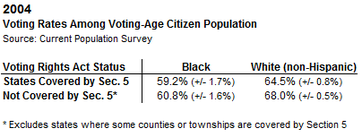Earlier this week I blogged about Chief Justice John Roberts’ contention, during oral arguments over the Voting Rights Act, that black voting rates are now higher in Mississippi than in Massachusetts. My take: statistically speaking, he was probably right. Today, Nate Silver dives a little deeper and adds some important detail. First, on a purely analytical basis, he notes that Roberts was apparently referring to 2004 Census data, so that’s what we should take a look at too. Second, because any single state might be cherry picked, we really ought to compare all states covered by the VRA to all states not covered. This also reduces our margin of error. Here are the results:

States covered by the VRA clock in at a 59.2 percent black voting rate, while non-VRA states clock in at 60.8 percent. Silver comments:
So did Chief Justice Roberts misconstrue the data? If he meant to suggest that states covered by Section 5 consistently have better black turnout rates than those that aren’t covered by the statute, then his claim is especially dubious. However, the evidence does support the more modest claim that black turnout is no worse in states covered by Section 5. There don’t seem to be consistent differences in turnout rates based on whether states are covered by Section 5 or not.
But there’s more to it than this:
The fact that black turnout rates are now roughly as high in states covered by Section 5 might be taken as evidence that the Voting Rights Act has been effective….If the Voting Rights Act has been important in facilitating the changes, how many of the gains might be lost if the Section 5 requirements were dropped now?
These are difficult questions that the Supreme Court faces. They are questions of causality — and as any good lawyer knows, establishing a chain of causality is often the most difficult chore in a case. Statistical analysis can inform the answers if applied thoughtfully. But statistics can obscure the truth when they become divorced from the historical, legal and logical context of a case.
This, of course, is the key question. Are black voting rights now secure in VRA states? Or are they only secure because of the VRA? This is the key question, and it’s difficult to see how the Supreme Court can—or should—be the arbiter of this.








